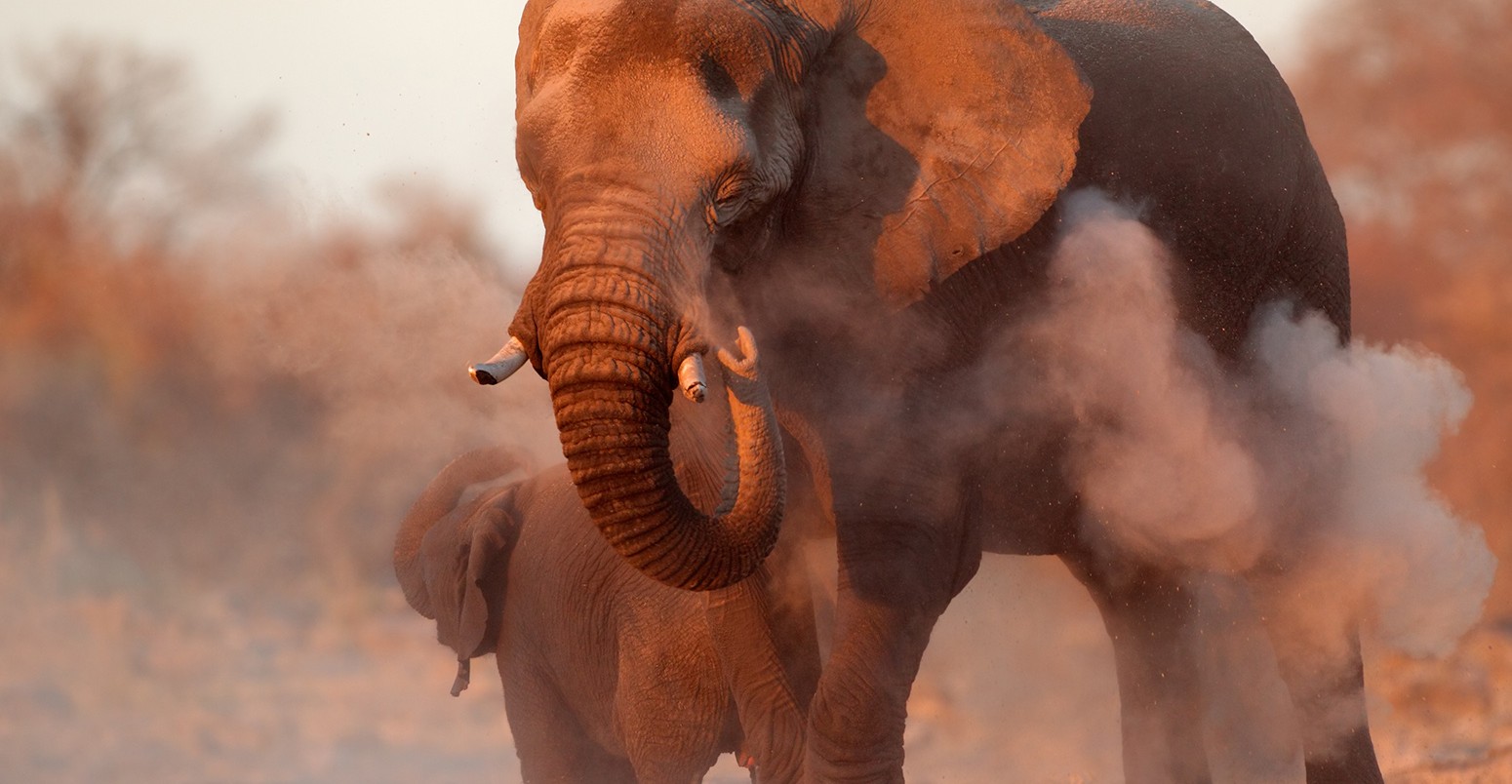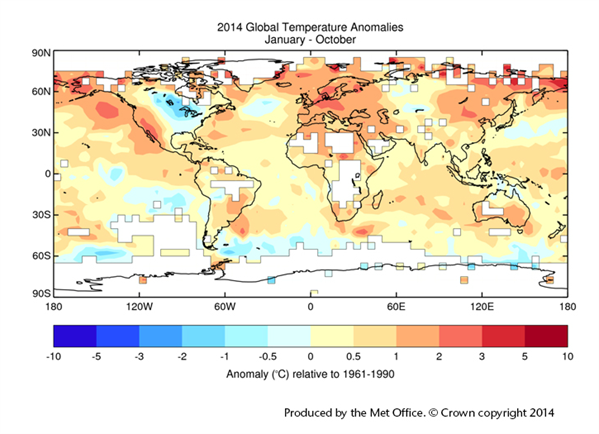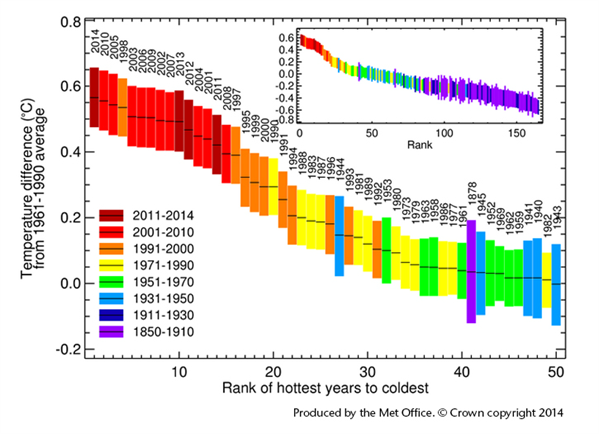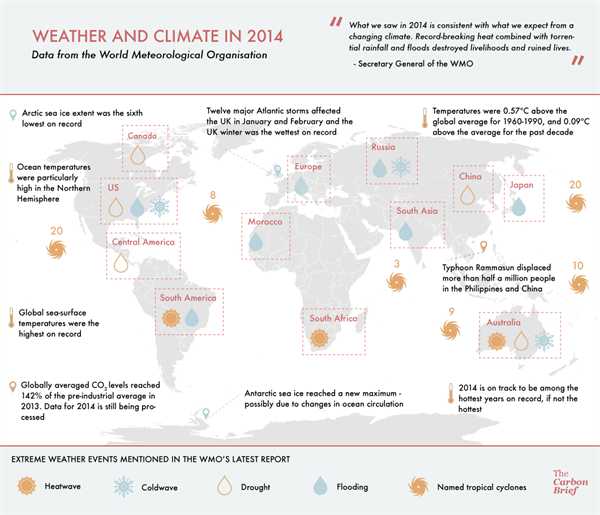
2014 on course to be the hottest year on record
Carbon Brief Staff
12.03.142014 is expected to be the among the hottest years since records began for the UK and the world, and may well prove to be the hottest, according to data from the World Meteorological Organisation (WMO) and the UK Met Office.
Rising temperatures are already contributing to greater risks of extreme weather, scientists warn.
A very warm and wet year for the UK
Met Office figures released today show the mean UK temperature for 2014 is 1.6 degrees Celsius above the long-term average. Currently 2006 is the warmest year since records began in 1910, but 2014 looks likely to replace it.
In England, where temperature records stretch back further, 2014 will be one of the warmest in the 350-year Central England Temperature (CET) record, the longest instrumental record in the world.
This year has also been a very wet one for the UK, and is on course to be the fourth wettest on record. A rainy December could even put 2014 over the annual record of 1337 mm set in 2000, says the Met Office.
A record-breaking year for the world
Globally, it seems likely that 2014 will be the hottest since records began in 1850. Average air temperature over the land and sea surface for 2014 so far is 0.57°C above the 1961-90 average. The previous high of 0.55°C warmer is held jointly by 2005 and 2010.
The ranking of hottest years is shown in the chart below. The red bars show years since the turn of the century, and show that for the most part the hottest years on record have occurred in the past decade or so.
It is important to note that the difference between the rankings comes down to a few hundredths of a degree, which is smaller than the uncertainty in the measurements.
Ranking of 50 hottest years since global records began, with the inset graph showing the ranking of all years in the record. The warmest years are towards the left, and are coloured according to when they occurred. The length of the bars shows the uncertainty in the measurement. UK Met Office.
WMO Secretary-General Michel Jarraud warns that “there is no standstill in global warming,” adding:
“The provisional information for 2014 means that 14 of the 15 warmest years on record have all occurred in the 21st century,”
Warming of land and oceans
On land, global air temperature this year is 0.86°C above average, putting it in the top five warmest years on record.
Europe, eastern Asia, western North America and much of Australia are all having a very warm year, shown as orange and reds on the map below. The patches of blue show central Russia and central and eastern North America are experiencing cooler-than-average temperatures.
 2014 Global temperatures relative to the long-term average. UK Met Office.
2014 Global temperatures relative to the long-term average. UK Met Office.
This year has also seen the highest global average sea surface temperatures on record, at 0.45°C above average.
Surface temperatures are high across many of the world’s oceans, particularly in the eastern tropical Pacific Ocean. Usually such elevated temperatures would be associated with the natural climate cycle El Niño, which warms the planet overall. While an El Niño event is expected this year, it’s not showing strong signs of materialising just yet. According to Professor William Collins from the University of Reading:
“It is worrying that these temperatures are occurring even without an El Niño event.”
The WMO estimates that the heat content of the world’s oceans from the surface down to 2,000m is the highest ever recorded. Scientists have speculated that more heat has been absorbed by the oceans in recent years.
Increasing risk of extreme weather
Professor Joanna Haigh, atmospheric physicist and Co-Director of the Grantham Institute, warns that the high temperatures have come at the same time as a range of weather extremes:
“2014 is on course to be the hottest year on record as well as having experienced a range of exceptional weather events, especially heat waves and flooding, across the globe.”
Much of Europe, Asia and South America have been hit by flooding this year, while China, western US and Australia have experienced drought. While it’s not possible to say a specific heatwave or flooding event only happened because of climate change, scientists know rising temperatures are making such events more likely. We’ve summarised some of 2014’s extreme weather events in the figure below.
The weather and climate of 2014. Carbon Brief.
Another recent report from the UK Met Office finds it is “now evident that human influence is not only driving long-term trends in global average temperature, but is also impacting on the risk of weather extremes.”
In the UK, for example, the study suggests that despite drier summers, increasing intense rainfall could make flash flooding almost five times more frequent by 2100.
The climate “is not going to wait”
One warm year doesn’t prove the climate is changing, much as one cool year doesn’t disprove it. However, the trend towards warmer global temperatures visible in the long-term trend underlines the impact humans are having on the planet’s climate.
As Dr Peter Stott of the Met Office puts it:
“current global average temperatures are highly unlikely in a world without human influence on the climate.”
Greenhouse gas concentrations in the atmosphere hit a record high in 2013, according to WMO data. (Data for 2014 is yet to be processed.) With increasing levels greenhouse gases in the atmosphere, it shouldn’t be surprising that temperature records continue to tumble.
As Anders Levermann from the Potsdam Institute for Climate Impact Research and lead author of the IPCC chapter on sea-level rise, tells Carbon Brief:
“If 2014 indeed becomes the warmest year on record globally, it ties up with previous records we have already seen within this decade. With greenhouse gas emissions continuing to rise, we will probably see more and more of these records.”
This news of record temperatures is timed to coincide with world leaders meeting in Lima to lay the groundwork for a binding global climate deal in Paris next year. Professor Sir Brian Hoskins, Chair of the Grantham Institute, explains the pressing need for a global agreement to reduce emissions:
“The climate system is not going to wait for them. There must be an agreement by all in Paris in a year’s time that will lead to global greenhouse gas emissions peaking before 2030 and then falling rapidly, so as to limit the damage we are doing to our planet and the risk it implies for all the people of the world.”



